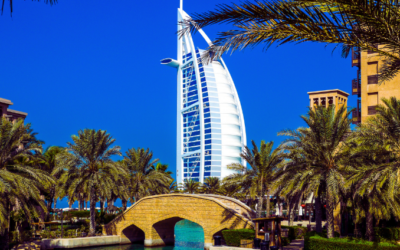Boom times in the Middle East
From Dubai and Abu Dhabi, to Saudi and Qatar, there is a growing demand for international education. Sally Robinson reports.
The Middle East is the world’s fastest growing region for international schools, thanks to a growing population, a post-pandemic influx of expats and a voracious appetite for an international English-medium education.
According to a recent ISC Research report exploring the growth in international schools, western Asia (excluding Egypt) is the leading region globally for international school enrolments, with just under two million students. Over the last five years there has been an eight per cent increase in the number of international schools to 2050.
“The most premium markets are Dubai, Abu Dhabi, and probably Qatar,” Ashwin Assomull of LEK Consulting told a recent International and Private Schools Education Forum conference in London. “Riyadh also represents a huge opportunity, but at a lower price point.”
Demand is being driven by an increase in the number of expats, particularly from China, Ukraine, Russia and South East Asia, coupled with the return of western expats post-covid, particularly in Dubai, where the population of 3.5 million is expected to almost double in the next 20 years.
There is also an increasing and significant demand from locals, particularly in Saudi, where many parents benefitted from an international education and want the same for their children. Elsewhere in the region, Qatar, Shajah and Ras Al Khaimah are also growing markets.
The resilience of Dubai
Not surprisingly, Dubai, the region’s commercial, financial and tourism hub, is the biggest market for education in the region with 245 international schools. The K-12 market rode the pandemic well and the expats are back. “The market has been incredibly resilient,” says Assomull.According to Dubai’s Knowledge and Human Development Authority (KHDA), the British curriculum is the most popular, studied by 36 per cent of students, followed by the Indian and American (the latter is the most popular with Emirati students – studied by 60% of them). Schools in the city offer a huge range of other national curriculums including Australian, German, Russian and Japanese.
Premium and super premium schools are the fastest growing segments in Dubai and have seen a strong post-covid growth. “They have gained share over budget and mid-price segments for three reasons – trade ups, the rising affluence of population and increased inflow of western expats,” says Assomull. Dubai has also benefitted from China’s demise as an destination for international schools.
According to LEK, Dubai’s premium education sector is almost at capacity – 88 per cent of seats were full in at the end of 2022, a figure it expects to increase to around 95 per cent by September 2023. “The KHDA is actively looking to recruit schools to Dubai – it wants to bring high quality names to the market,” says Assomul.
The last few years have seen a spate of successful premium openings: the Royal Grammar School Guildford opened in 2021 (it also has a school in Qatar and is opening in Oman) and his September mega education provider GEMS, which operates 60 schools in the MENA region, opens its new Metropole K-12 school, following a British curriculum and with capacity for 3500 students. Dubai-based Taaleem, one of largest K-12 operators in the Middle East, is set to open a third school in the city in 2024, the British School Jumeirah.
The new schools join a solid base of premium schools already in the city including Repton, the first British ‘brand’ school’ which opened in 2007; Nord Anglia, NLCS and Brighton College.
Abu Dhabi: a booming local market
Abu Dhabi also offers strong demand for international schools: Aldar Education (which owns and operates seven schools in the region, including Cranleigh) reports a 9% rise in admissions for the 23/24 school year. The city itself is half size of Dubai, but it is the wealthiest emirate with the fastest-growing economy, according to the Department of Economic Development. It has 144 international schools with the British curriculum being the most popular.According to LEK, the super-premium segment is strong here, but education providers need to cater for the local market.
“Nationals are coming to international schools wanting a British education,” says Assomull.Repton is one of the longest established premium schools in Abu Dhabi, opened in 1992, while Brighton College followed in 2011 and Cranleigh in 2014. This September Nord Anglia will open its second school in Abu Dhabi, a purpose built campus delivering the British curriculum. The American Community School is also building a new campus ready accept students in 23/24.
Unlocking the Saudi potential
Saudi Arabia is the emirate creating the biggest buzz right now. Private international education is predicted to see strong growth over the coming years due to a young, highly educated and growing population, and an increase in high income expats as more global companies set up headquarters in Riyadh. Education is also an important part of Saudi Vision 2030, the policy for diversifying the economy away from oil.
The biggest difference between Dubai and Abu Dhabi and Saudi, is that it is dominated by Saudis – not other nationalities. Of the 32.2 million population, 63 per cent are under the age of 30 according to recent census figures. The population has increased by 34.2 per cent since 2010.According to LEK Consulting, most growth will be in the premium sectors, driven by Saudi nationals who have a preference for the international curriculum.
“There is lots of excitement about Riyadh and big changes are happening there,” says LEK’s Assomull. “There is a concerted focus on bringing in high quality schools like Downe House, which opened in 2022, not for the expats, but for the nationals who are moving from the public into the private system. The question is around affordability.”
Several school groups have entered Saudi recently, including the UK-based Chatsworth Schools, under its international arm Blenheim, which has partnered with local property developer Fawaz Alhokair to open premium British schools in Saudi. The first, Beech Hall, opened in August 2023.
“Saudi is pretty insatiable for us, it’s a real growth market, says Anita Gleave, founder and CEO Chatsworth Schools which has 16 schools in the UK as well as in Dubai and now Riyadh. Gleave also champions the SEND provision her schools provide: “We offer an inclusive education and there’s a hunger for that in the region. It’s something that people will now finally talk about.”
Reigate Grammar also opened in Riyadh in 2022, a rebrand of an existing school. “The demand was there from day one,” says Sean Davey, managing director of the school’s international interests. “The market is huge – in the last 18 months the student numbers have gone from about 350 to over 1000.”
The newcomers join a raft of other premium British schools which have opened in the last two years, part of the Royal Commission Riyadh City’s International School Attraction Programme. These include Downe House, Saudi’s first British premium all-girls school, Aldenham Prep and King’s College Riyadh, a K-12 branch of the Wimbledon school.
Other curriculums are well represented: An offshoot of Singapore’s One World School opened in following the American curriculum and SEK International School, which opened in 2021, brings the IB to Saudi and is part of an international group with schools in Spain, France, Qatar and Ireland.
“Saudi has moved from being an inward looking society into an outward-looking one, inviting western investment and education, says Dr Steffen Sommer, director of Misk Schools and ex-director of Doha college. The challenge of establishing a school in the region include concerns around human rights. “Schools have to be ready for the arguments that will come,” says Pam Mundy, consultant director of schools and education for NEOM, the new Saudi giga city. “My tip is to visit and see for yourself.”
Elsewhere in the region, Qatar is predicted to see major growth over the next decade and is committed to attracting international schools as part of its National Vision 2030. According to the Boston Consulting Group, Qatar’s private education market is expected to grow to $2.4 billion by end of 2023. The country currently has over 140 international schools, most in Doha. There were 338 international curriculum private schools operating in Qatar in 2020-2021 academic year.
Academic enrichment
The UK’s private schools, including Eton, Canford in Dorset and Marlborough, have their own eco-system of summer programmes, often hosted by commercial operations.
Sevenoaks School, one of the top performing schools in the country, offers its own summer ‘academic enrichment’ course for 11–17 year olds, incorporating four modules: critical thinking, social leadership, creativity and digital skills.
For a fully-rounded experience combining learning, creative enrichment and adventure, ISSOS is one of the longest-running summer school providers. Its three-week residentials take place at St Andrews University in Scotland, Cambridge University and Yale in the US, for students aged 13–18. Places of any one nationality are limited to 10% to guarantee an international experience. “Academic classes are taught by highly qualified teaching staff who are all experienced working professionals in their subject areas and many come back every year,” says marketing manager Caitlin Hanlin.
For an American-style summer camp with a focus on making friends and having fun, Camp Cooper runs one- and two-week camps in Scotland for 7–17 year olds. Campers choose from a range of options including tennis, art, outdoor adventure, tennis and filmmaking.
From film to football – something for everyone
Tech is an increasingly popular focus at summer camps that gives students the chance to learn new skills, such as software design and basic coding, that might not be taught in school.
At Techcamp, courses are designed and run by engineers and students get to take home their custom-built projects. These long-established residential and non-residential courses in Oxford, London and Winchester include coding, engineering, 3D game design, drone racing, Python AI and VR design.
FunTech offers residential and day camps where students can study game coding, cyber security and game design.For students who prefer musical theatre, drama, singing and dance there are some exciting options including West End Stage held at the Guildhall School of Music and Drama, which is led by West End professionals and culminates in a performance at Her Majesty’s Theatre.
The Guildford School of Acting at the University of Surrey summer camps include acting, singing, voice and dance taught by GSA conservatoire tutors. Aspiring filmmakers get to make their own film at the Young Film Academy’s hands-on residential summer camp at Culford School in Suffolk.
Learning or improving a language is one of the traditional reasons for attending a summer school. For an immersive experience the Sorbonne University in Paris offers two-week French courses taught by academics from the university and Malaga University runs four-week intensives in Spanish over the summer. In the UK, UCL offers two-week summer intensive language classes in Arabic, French, Italian, German, Japanese, Mandarin and Spanish.
The Swiss tradition
Switzerland has a tradition of running dynamic, well-organised summer schools, often with an emphasis on team building and outdoor activity. Many are held at the country’s network of elite boarding schools, providing great facilities amid spectacular Alpine scenery. Le Rosey has been running camps for 40 years and provides a mix of sporting, academic and artistic activities at its campuses on Lake Geneva and in the mountains at Gstaad. Brillantmont welcomes students from 30 countries with nationality quotas to ensure diversity. Its programmes include French or English classes in the morning and sports in the afternoon.
At the College du Leman between Lake Geneva and mountains, students devise their own summer programme choosing from languages to business and technology.





